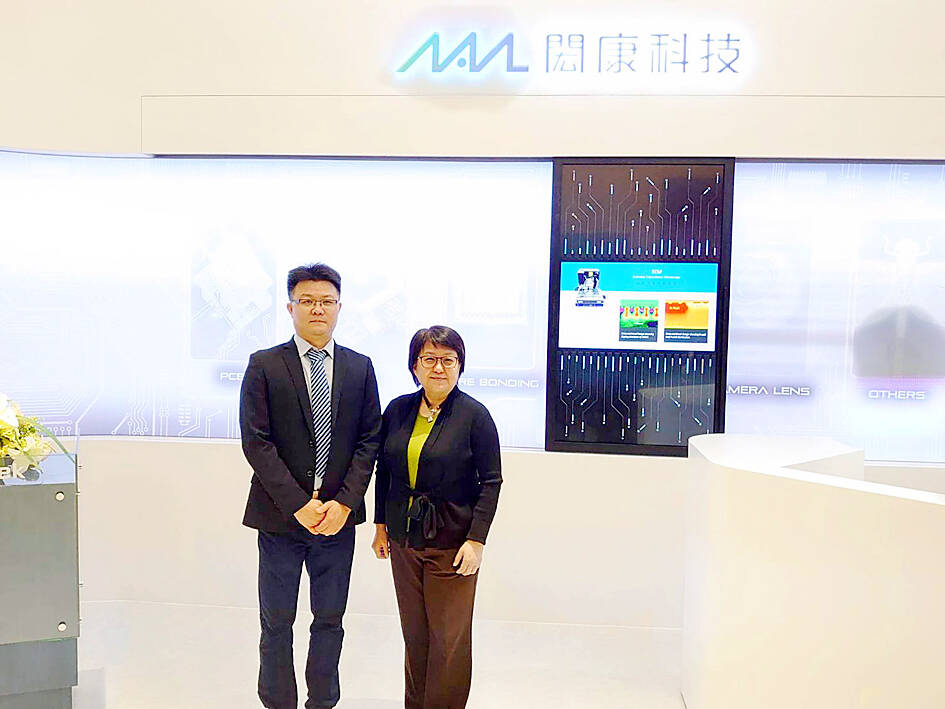Materials Analysis Technology Inc (MA-tek, 閎康) yesterday said it plans to build a new laboratory in Hokkaido, Japan, to satisfy customers’ growing demand amid the Japanese government’s push for a semiconductor manufacturing revival.
The laboratory would be the third lab operated by Materials Analysis Technology in Japan.
It also has labs in Kumamoto and Nagoya.

Photo: CNA
Capacity expansions are also planned for the existing fabs to meet customer demand, the company said.
The expansions in Japan aim “to grasp business opportunities deriving from Japan’s semiconductor revival plan and to assist customers to step up research-and-development,” Materials Analysis said in a statement.
The company has been considering setting up a new lab in the northern area of Japan since September last year after Rapidus Corp, a chipmaker backed by the Japanese government, held a groundbreaking ceremony for its first chip manufacturing factory in Chitose, Hokkaido.
The Japanese semiconductor start-up plans to start a pilot production line at the fab in April next year before beginning volume production of 2-nanometer chips in 2027.
In China, Materials Analysis also plans to build its new lab in Suzhou, the fourth in the country, catering to increasing Chinese customers’ demand for chip analysis for third-generation semiconductors that use materials such as gallium nitride or silicon carbide to replace silicon.
Beijing’s push for semiconductor self-sufficiency also drove up demand, the company said.
Materials Analysis Technology said it is seriously evaluating whether to build more labs in Europe or the US, following the steps of its key customers to provide efficient and local services.
Materials Analysis Technology counts chipmakers and foundry companies as its main customers, including Taiwan Semiconductor Manufacturing Co (TSMC, 台積電), Intel Corp and Advanced Micro Devices Inc, providing material and chip reliability analysis.
TSMC plans to construct a new chip plant in Dresden, Germany, in the fourth quarter of this year together with its partners.
The company said it would capitalize on global footprint expansions to drive next-wave growth, as semiconductor manufacturing is becoming increasingly localized due to national security concerns and geopolitical tensions.
At home, Materials Analysis Technology would concentrate on providing analysis services for advanced process technologies and advanced chip packaging technologies.
The company raised its capital expenditures for this year by 17 percent to between NT$1.2 billion and NT$1.4 billion (US$37.1 million and US$43.3 million), compared with NT$1.2 billion spent last year.
About half of the investment would be earmarked for its expansion in Taiwan.
With the new capacity expansions worldwide, Materials Analysis said it expects net profits to grow this year.
Last year, net profits rose 9.38 percent year-over-year to NT$686.21 million from NT$627.37 million the previous year, setting an all-time high. That translated into earrings of NT$10.81, up from NT$10.12 a year ago.
The company’s shareholders yesterday approved the distribution of a record-high cash dividend of NT$9 per common share. That represented a payout ratio of about 83 percent.

Zhang Yazhou was sitting in the passenger seat of her Tesla Model 3 when she said she heard her father’s panicked voice: The brakes do not work. Approaching a red light, her father swerved around two cars before plowing into a sport utility vehicle and a sedan, and crashing into a large concrete barrier. Stunned, Zhang gazed at the deflating airbag in front of her. She could never have imagined what was to come: Tesla Inc sued her for defamation for complaining publicly about the vehicles brakes — and won. A Chinese court ordered Zhang to pay more than US$23,000 in

Taiwan Semiconductor Manufacturing Co (TSMC, 台積電) yesterday said that its investment plan in Arizona is going according to schedule, following a local media report claiming that the company is planning to break ground on its third wafer fab in the US in June. In a statement, TSMC said it does not comment on market speculation, but that its investments in Arizona are proceeding well. TSMC is investing more than US$65 billion in Arizona to build three advanced wafer fabs. The first one has started production using the 4-nanometer (nm) process, while the second one would start mass production using the

A TAIWAN DEAL: TSMC is in early talks to fully operate Intel’s US semiconductor factories in a deal first raised by Trump officials, but Intel’s interest is uncertain Broadcom Inc has had informal talks with its advisers about making a bid for Intel Corp’s chip-design and marketing business, the Wall Street Journal reported, citing people familiar with the matter. Nothing has been submitted to Intel and Broadcom could decide not to pursue a deal, according to the Journal. Bloomberg News earlier reported that Taiwan Semiconductor Manufacturing Co (TSMC, 台積電) is in early talks for a controlling stake in Intel’s factories at the request of officials at US President Donald Trump’s administration, as the president looks to boost US manufacturing and maintain the country’s leadership in critical technologies. Trump officials raised the

From George Clooney to LeBron James, celebrities in the US have cashed in on tequila’s soaring popularity, but in Mexico, producers of the agave plant used to make the country’s most famous liquor are nursing a nasty hangover. Instead of bringing a long period of prosperity for farmers of the spiky succulent, the tequila boom has created a supply glut that sent agave prices slumping. Mexican tequila exports surged from 224 million liters in 2018 to a record 402 million last year, according to the Tequila Regulatory Council, which oversees qualification for the internationally recognized denomination of origin label. The US, Germany, Spain,